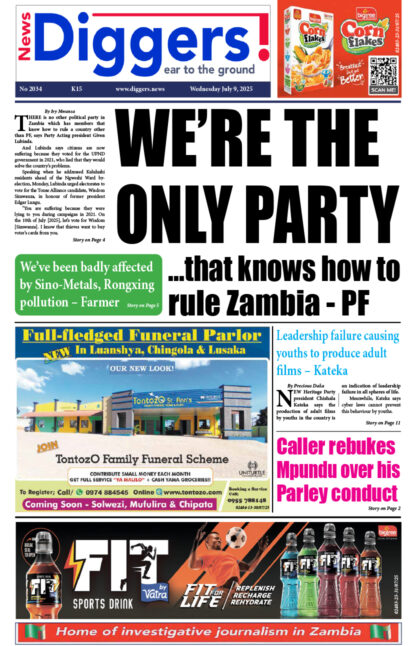Patriotic Front (PF) Secretary General Davies Mwila says the prevailing debt and economic situation in Zambia must not be misconstrued as a financial crisis but should rather be seen as financial responsibility.
In his weekly newsletter to News Diggers, Mwila stated that government had instituted various economic interventions to moderate the risk of high debt distress for the country.
“Since Zambia has not suffered a speculative attack on the currency resulting in a devaluation (or sharp depreciation), forcing government to defend the currency; Zambia is not in a currency crisis. Prudent debt management calls for regular checks on our debt to ascertain whether we are on the sustainability track or the un-sustainability track. Government conducts regular debt sustainability analyses to inform policy decisions with regard to prudent debt management,” Mwila stated.
He stated that the party in power had instituted various economic interventions since 2018 in order to moderate the risk of debt distress.
“There are various economic interventions that the Government has instituted since July 2018, anchored on the DSA and MTDS as follows: Postponement of the contraction of all pipeline external debt until the high risk of debt distress is brought to a moderate level; Cancellation some of the contracted loans that have not been disbursed, in order to reduce the debt service burden; Undertaking an asset-liability exercise on selected loans to extend the maturity profile and attain lower interest costs; Cease issuance of guarantees to commercially viable projects; Cessation of the issuance of Letters of Credit and Sovereign Guarantees to institutions that are technically insolvent until their balance sheet challenges are resolved,” Mwila stated.
“The PF Government continues to constrain the primary balance while attracting concessional financing for the Budget to mitigate the adverse implications of high debt service in the medium term, by; curtailing the accumulation of debt and reorganizing the current debt portfolio in order to minimize costs and mitigate the risks associated with it. The PF government did not start implementing these measures in 2019, but has been implementing these economic interventions in line with its 2017-2019 Medium Term Debt Strategy (MTDS) which outlines PF Government’s plan over the medium term with regards to fiscal and debt management. In addition to this, control of the fiscal deficit is a high priority for the PF Government.”
And Mwila argued that if a household decided to become more prudent with its expenditure to avoid more debt, that could not be said to be a debt crisis, adding that the same applied to government.
“The PF Government has been implementing various measures aimed at achieving macroeconomic stability and debt sustainability; fiscal restraint to achieve low levels of primary balance deficit through the current Medium-Term Expenditure Framework (MTEF), to mention only two. If a household decides to reduce expenditure on its capital project (e.g. constructing a house) in the medium term so as to maintain household debt within sustainable levels – that cannot be called financial crisis, that is called financial responsibility! A household deciding to become more prudent with its expenditure to avoid more debt cannot be said to be in a debt crisis; the same way that a Government whose mantra is ‘Managing for Results, By Doing More With Less’ cannot be said to be in as a debt crisis. Such measures mean responsible interventions which should be supported by all well-meaning Zambians regardless of the political persuasion. To be sure, Zambia is not in a financial (or debt) crisis, and its mantra of managing for results, by doing more with less’ should not be misconstrued to mean crisis, but a responsibility,” stated Mwila.


















